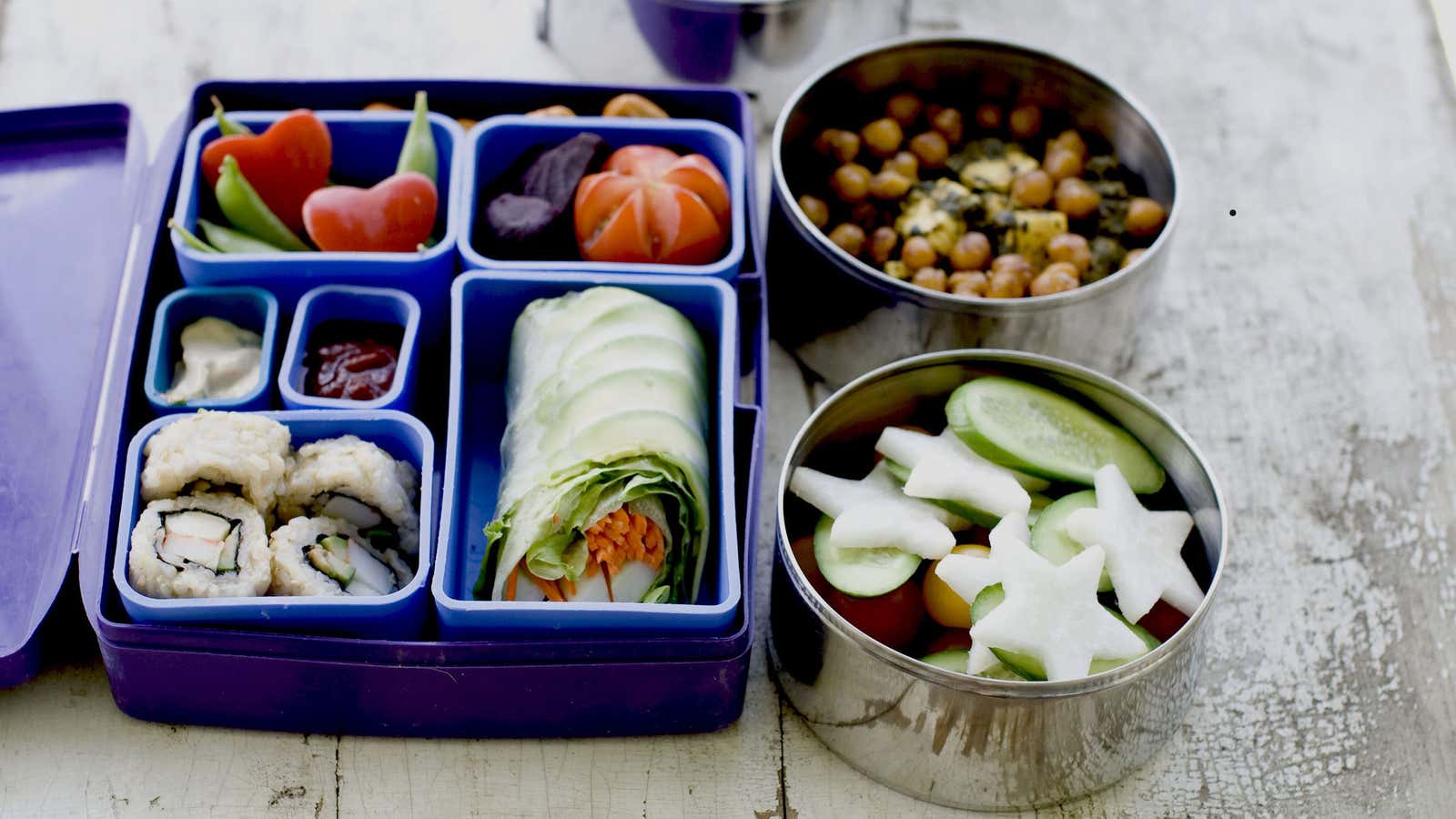Two thousand and five hundred years ago, Buddha suggested some basic guidelines for eating to his monks. He recommended that they limit their eating to certain hours rather than grazing throughout the day. When they did eat, he said, they should give their food the attention it deserved.
Today, as we write in our book Buddha’s Diet, scientific research has confirmed the wisdom of these principles. But Buddha never had a nine-to-five job. And as any office worker surrounded by free snacks and boxes of meeting doughnuts can attest, the modern workplace can make it hard to stick to healthy habits.
Here are a few evidence-backed ways that you can avoid common eating pitfalls at work—and stay in line with Buddha’s teachings while you’re at it.
Probably the best way to adopt healthier food habits at work is to take a real lunch break. In a recent study, over a third of office workers felt pressured to work through lunch and eat at their desk.
But many studies have shown that we make terrible food choices when we’re distracted. One found that moviegoers ate 45% more popcorn when it came in a large container rather than a medium-sized one. They were too distracted by the movie to tell the difference, and even people who disliked popcorn ate 33% more when given a large. In another study, women attended two 30-minute sessions and were asked not to eat for two hours before each visit. In one session, they sat in a room with various snack foods but were given nothing else to do, while in the other session, they watched TV. The results were the opposite of what you might expect: The TV watchers ate 55% more than the women sitting around with nothing else to do.
A true lunch break will let you focus on your food instead of your next big presentation. So instead of eating at your desk, go outside—or, if that’s not possible, find somewhere other than your desk to eat your food. If you feel like socializing, feel free. But do not stare at your phone during your meal, and don’t bring your computer. Don’t even bring a book. All you should be doing is eating, not multitasking.
Mindful eating can be a first step toward a more mindful approach to the rest of your day, too. One study of 103 administrative employees at a large North American university found that those who relaxed during lunch experienced less fatigue at the end of the day. Several other studies have shown that mindfulness—that is, focusing attention on the present moment—can improve employee performance and reduce staff turnover. It even seems to improve creativity. And, no matter what, taking some time to recharge during lunch is likely to help your work in the long run.
Stress-eating at work is another common problem. There’s a reason many of us turn to eating when stress hits. Food is a natural reward, and many traditional comfort foods—ones full of starch, fat, and sugar—are scientifically proven to improve our mood for a time.
But while stress eating might bring momentary relief, it’s not a sound strategy for health—and it doesn’t reduce your stress in the long run. A study of both normal weight and overweight women in Germany found that both groups of women felt sadness, shame, and anxiety after eating high-calorie foods—with the overweight women reporting the most intense emotional responses. The “comfort foods” actually made them feel worse in the end.
To avoid overdosing on empty snacks and sugar at work, look at the times when you are most prone to do this. Likely it’s as the day wears on and your resolve starts to crumble. (After all, we rarely arrive at work and hit the candy bowl first thing.) Knowing that, set an alarm on your phone to remind you to get up and take a walk, chat with a friend, or anything that feels like a boost to you before the late afternoon mental fog rolls in. This way you are redirecting a habit. Or if you know you get hungry later in the afternoon (and make sure it’s hunger, not habit), bring a healthy snack that you can save for later. That way when you start to lag, you’ll be less vulnerable to the Krispy Kremes in the office kitchen.
There are other steps you can take to avoid packing on pounds at work, such as finding excuses to move around throughout the day. If you have a one-on-one meeting with a colleague, consider proposing a walk outside instead of settling into a conference room. Get up from your desk regularly and take a stroll, even if it’s just around the block. A study in Australia found that a short walk during the day improved enthusiasm and relaxation and reduced nervousness and overall stress. Other research has shown the effect is even greater if you can actually get to nature. For city dwellers, that may be too much to ask—but if there’s a garden or park near you, it’s worth seeking out.
We can’t promise that these steps will eliminate stress from your job. But these Buddhist-inspired principles will certainly help bring clarity, peace, and focus to your work—and help you keep your waistline in check, too.
